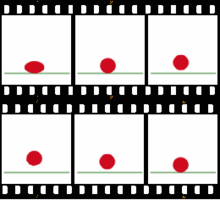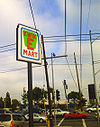Portal:Animation

| Main | Categories and topics | Tasks and projects |
Introduction
Animation is a filmmaking technique by which still images are manipulated to create moving images. In traditional animation, images are drawn or painted by hand on transparent celluloid sheets (cels) to be photographed and exhibited on film. Animation has been recognized as an artistic medium, specifically within the entertainment industry. Many animations are computer animations made with computer-generated imagery (CGI). Stop motion animation, in particular claymation, has continued to exist alongside these other forms.
Animation is contrasted with live-action film, although the two do not exist in isolation. Many moviemakers have produced films that are a hybrid of the two. As CGI increasingly approximates photographic imagery, filmmakers can easily composite 3D animations into their film rather than using practical effects for showy visual effects (VFX). (Full article...)
Selected article
The Kwik-E-Mart is a fictional chain of convenience stores in the animated television series The Simpsons. It is a parody of American convenience store chains, like 7-Eleven and Circle K and represents many myths and stereotypes of them. It is notorious for its high prices and the poor quality of its merchandise. The operator of the Springfield branch is an Indian-American named Apu Nahasapeemapetilon. It was first seen in the episode "The Telltale Head" and since become a common setting in several episodes. In July 2007, eleven 7-Eleven locations in the United States and one in Canada were transformed into Kwik-E-Marts as part of a special promotion for the The Simpsons Movie. For a limited time, 7-Elevens across North America also sold various Simpsons products, such as "Squishees", "Buzz Cola" and "Krusty-Os cereal". Also in 2007, a gift stores named the "Kwik-E-Mart" was opened in Universal Studios Orlando and Universal Studios Hollywood, where they will be a companion to the upcoming "The Simpsons Ride".
Selected image

Did you know (auto-generated) -

- ... that Paul Dini was a writer for both the animated television series Batman: The Animated Series and the video game series Batman: Arkham?
- ... that according to an elaborate 1990s joke, Elmo Aardvark was history's first animated cartoon character?
- ... that Encanto's Isabela Madrigal was animated to be aware that she is "always on stage"?
- ... that although Blizzard's franchise Overwatch is centered around video games, its lore is mainly told through animated shorts, comics, and novels?
- ... that Raoul Servais invented a new technique for combining animation and live action for his short film Harpya?
- ... that the Tuca & Bertie episode "The Jelly Lakes" employs a paper-cutout animation that helps to depict abuse in a way that centers the victim's story?
Selected quote
Selected biography
Maggie Roswell (born November 14, 1952) is an American film and television actress and voice artist from Los Angeles, California. Roswell made her acting break-through in the 1980s with appearances in films such as Midnight Madness (1980), Lost in America (1985), and Pretty in Pink (1986), and guest appearances on television shows such as Remington Steele, Masquerade, and Happy Days. She appeared frequently in the sketch comedy The Tim Conway Show from 1980 to 1981, and did voice acting for a few animated films and television shows. Roswell also performed in some theater plays, including one in 1988 directed by Julia Sweeney. Together they established the Roswell 'n' Rayle Company, creating and voicing advertisements for companies. Because of her move to Denver, Roswell had to travel to Los Angeles twice a week to tape The Simpsons. This ultimately led to her requesting a pay raise in 1999; however, Fox refused to offer her the amount she wanted so she quit the show. Roswell returned to The Simpsons in 2002 after reaching a deal to record her lines from her Denver home.
Selected list
The Annie Award for Best Animated Video Game is awarded annually by ASIFA-Hollywood, a non-profit organization that honors contributions to animation, to the best animated video game of the year. It is one of the Annie Awards, which are given to the best contributions to animation, including producers, directors, and voice actors. The Annie Award for Best Animated Video Game was created in 2005, and has been awarded yearly since. To be eligible for the award, the game must have been released in the year before the next Annie Awards ceremony, and the developers of the game must send a five-minute DVD that shows the gameplay and graphics of the game to a committee appointed by the Board of Directors of ASIFA-Hollywood. As of 2011, the Annie Award for Best Animated Video Game has been awarded to five video games. The video game development company THQ has had six of its games nominated for the Annie Award for Best Animated Video Game, and one of them, Ratatouille, has won the award.
More did you know...
- ...that Disney characters will regularly appear in 3D on television for the first time in the children's television series Disney's Mickey Mouse Clubhouse?
- ...that The Simpsons episode "In the Name of the Grandfather", scheduled to debut on Sky One, will be the first episode of the show to air in Ireland before airing in the United States?
- ...that Bulgarian animator Donyo Donev used deformed speech and interjections as a soundtrack for his films?
Anniversaries for June 2
- Films released
- 1951 – Room and Bird (United States)
- 1962 – Adventures of the Road Runner (United States)
- Television series and specials
- 1991 – Liquid Television, an animated showcase begins airing on MTV
- Births
- 1899 – Lotte Reiniger, German-born silhouette animator (d. 1981)
Subportals
Related portals
Wikimedia
The following Wikimedia Foundation sister projects provide more on this subject:
-
Commons
Free media repository -
Wikibooks
Free textbooks and manuals -
Wikidata
Free knowledge base -
Wikinews
Free-content news -
Wikiquote
Collection of quotations -
Wikisource
Free-content library -
Wikiversity
Free learning tools -
Wiktionary
Dictionary and thesaurus
























